
Johan Hendrik Caspar Kern was a Dutch linguist and Orientalist. In the literature, he is usually referred to as H. Kern or Hendrik Kern; a few other scholars bear the same surname.
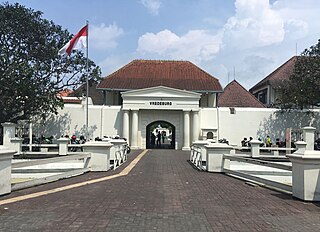
Fort Vredeburg Museum was a former colonial fortress located in the city of Yogyakarta, Special Region of Yogyakarta, Indonesia. The military complex has been converted into a museum of the Indonesian independence struggle which was opened in 1992. It is located in front of Gedung Agung and near the Kraton Yogyakarta.
Indonesian National Education Day or Hari Pendidikan Nasional abbreviated as HARDIKNAS is celebrated on 2 May. It was initiated in remembrance of Ki Hajar Dewantara, the founder of the Taman Siswa education system. His educational philosophy Tut Wuri Handayani means that we can help others learn by coaching and mentoring.

Raden Mas Soewardi Soerjaningrat ; from 1922 also known as Ki Hadjar Dewantara, which is also written as Ki Hajar Dewantoro to reflect its Javanese pronunciation, was a leading Indonesian independence movement activist, writer, columnist, politician, and pioneer of education for native Indonesians in Dutch colonial times. He founded the Taman Siswa school, an institution that provided education for indigenous commoners, which otherwise was limited to the Javanese aristocracy and the Dutch colonials.
Jona Lendering is a Dutch historian and the author of books on antiquity, Dutch history and modern management. He has an MA in history from Leiden University and an MA in Mediterranean culture from the Amsterdam Free University, taught history at the Free University, and worked as an archivist employed by the Dutch government, before becoming one of the founders of the history school Livius Onderwijs.

Ki Soegondo Djojopoespito was an Indonesian politician who became the Minister of Societal Development in the Halim Cabinet.
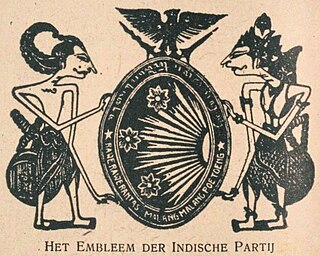
The Indische Partij (IP) or Indies Party was a short-lived but influential political organisation founded in 1912 by the Indo-European (Eurasian) journalist E.F.E. Douwes Dekker and the Javanese physicians Tjipto Mangoenkoesoemo and Soewardi Soerjaningrat. As one of the first political organisations pioneering Indonesian nationalism in the colonial Dutch East Indies it inspired several later organisations such as the Nationaal Indische Party (N.I.P.) or Sarekat Hindia in 1919 and Indo Europeesch Verbond (I.E.V.) in 1919. Its direct successor was Insulinde.
Javanese Surinamese are an ethnic group of Javanese descent in Suriname. They have been present since the late 19th century, when their first members were selected as indentured laborers by the Dutch colonizers from the former Dutch East Indies.
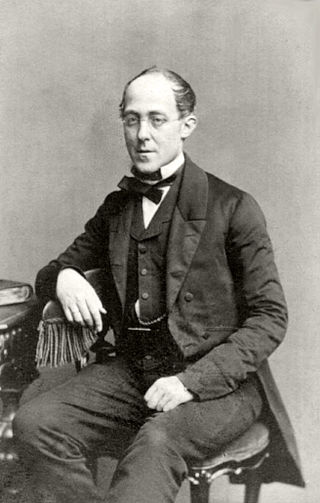
David Bierens de Haan was a Dutch mathematician and historian of science.
Mercu Buana University is a private university is a private university under the Menara Bhakti Foundation located in Jakarta. Mercu Buana University is one of the best universities in Indonesia, which has a long history with a good reputation. This is evidenced by the ranking of Mercu Buana University at the national and international levels. Internationally, Mercu Buana University has been named Number One Private Higher Education based on the AD Index Scientific Ranking in 2022 and ranked 3rd Best Private University in DKI Jakarta from 4 International Colleges and Universities (UniRank) in 2022. Domestically, Mercu Buana University occupies the position of eleven nationally and number three in Jakarta based on the 2022 Webometric ranking. Meanwhile, according to the 2020 Indonesian Higher Education Clusterization by the Directorate General of Higher Education, Ministry of Education, Culture, Research and Technology of the Republic of Indonesia, Mercu Buana University is ranked 33 nationally. The four international and national accreditations are enough to prove that Mercu Buana University is a reputable campus

Adriaan Kluit was a Dutch scholar, important in Dutch linguistics. He was born in Dordrecht. He was rector of the Latin school in Alkmaar and Middelburg. In 1779 he became the professor of history at the University of Leiden, remaining there until his death.
Universitas Sarjanawiyata Tamansiswa Yogyakarta is a university in Yogyakarta City in Indonesia.

Soerjopranoto was an Indonesian politician and labor leader. He founded and lead the Personeel Fabriek Bond (PFB), a labor union associated with the Sarekat Islam movement, of which he was a member of from 1915 to 1933. He was dubbed "The Strike King" by the Dutch press for his involvement in the labor movement. He was also the elder brother of Ki Hajar Dewantara, a pro-independence activist and nationalist. Following his death, Soerjopranoto was proclaimed a national hero by President Sukarno.
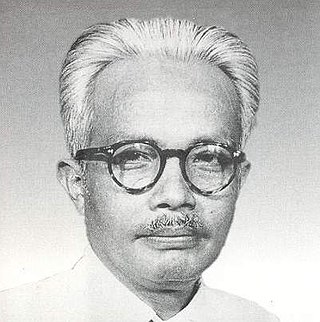
Ki Sarmidi Mangunsarkoro acted as the Minister of Education and Culture of Indonesia in 1949 until 1950. He is now regarded as a National Hero of Indonesia.

The Supreme Advisory Council, was an advisory council for the President of Indonesia which existed from 1945 to 2003, with a brief interruption from 1950 to 1959. Largely composed of senior and retired government figures, the DPA was generally regarded as powerless. Its functions were limited to offering proposals to the government on matters of national importance as well as opinions on matters raised by the president. The DPA was replaced by the Presidential Advisory Council in 2003.
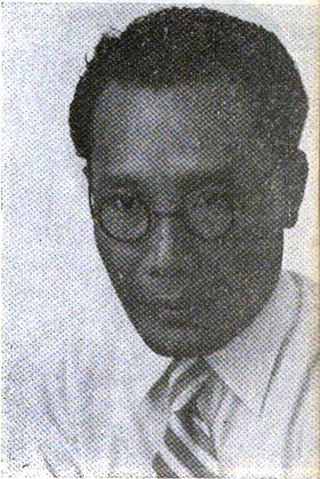
Sarino Mangunpranoto was an Indonesian politician, teacher, and educator, who served as the 11th Minister of Education and Culture of Indonesia, from 1956 until 1957. A member of the Indonesian National Party (PNI), he also served as the Ambassador of Indonesia to Hungary, a member of the People's Representative Council from 1950 until 1956 and again from 1960 until 1962, as well as a member of the United States of Indonesia Senate, representing Central Java.

KRI Ki Hajar Dewantara (364) is a Dewantara-class training corvette of Indonesian Navy that was built in SFR Yugoslavia. The ship was built in 1980 and was decommissioned in 2019. She is planned to be preserved as museum ship.

Paul Alex Blaauw, usually known as P. A. Blaauw, was an Indo politician, lawyer, and member of the Dutch East Indies Volksraad representing the Indo Europeesch Verbond from the 1920s to the 1940s. During the period of transition to Indonesian independence and the 1949 Dutch–Indonesian Round Table Conference he was a leader of the largest faction advocating for the rights of Indos.

The Indonesian Women's Congress, often known by its Indonesian acronym Kowani, is a federation of Indonesian women's organizations which was founded in 1946. Its headquarters are located in Jakarta. The name also refers to national congresses which have taken place regularly since 1928. Since its founding the Congress has included women from various political and religious backgrounds; it has generally allowed independence and autonomy for its member organizations.
Censorship in the Dutch East Indies was significantly stricter than in the Netherlands, as the freedom of the press guaranteed in the Constitution of the Netherlands did not apply in the country's overseas colonies. Before the twentieth century, official censorship focused mainly on Dutch-language materials, aiming at protecting the trade and business interests of the colony and the reputation of colonial officials. In the early twentieth century, with the rise of Indonesian nationalism, censorship also encompassed materials printed in local languages such as Malay and Javanese, and enacted a repressive system of arrests, surveillance and deportations to combat anti-colonial sentiment.














